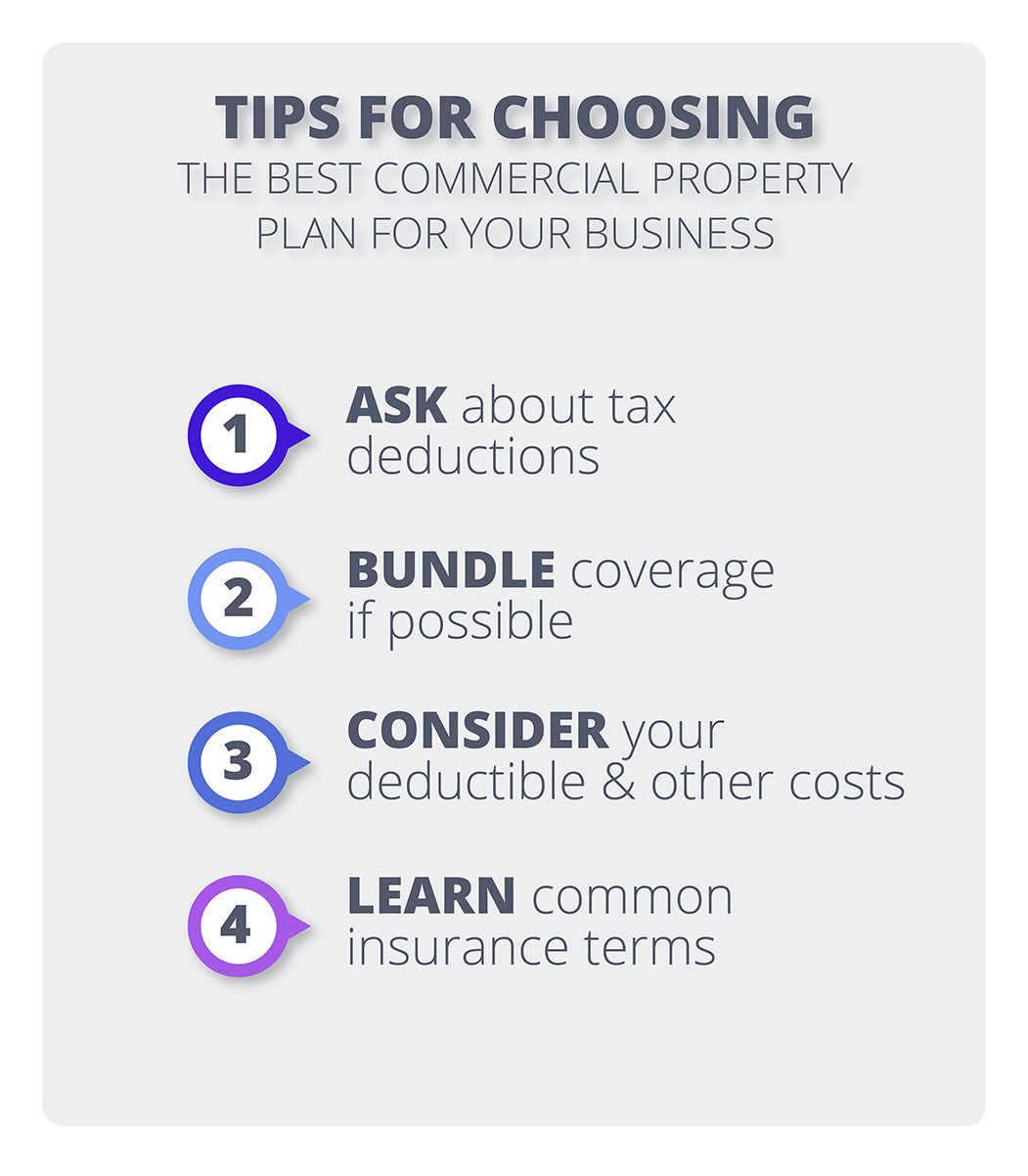
Commercial property insurance
Commercial property insurance
Commercial property insurance pays to repair or replace stolen, lost, or damaged business property. It covers your business’s physical location and other assets like equipment.
Why is commercial property insurance important for small businesses?
Commercial property insurance protects against the risks of owning or renting an office, storefront, or other business property. It covers property losses when a fire damages your office, or a pipe bursts and floods your store.
Items that are covered include:
- Inventory
- Furniture and fixtures
- Computers and electronics
- Tools and equipment
- Broken windows and structural damage
- Lost income (when your policy includes business interruption insurance)
If you rent a commercial space, your landlord may require you to carry this coverage. Even when it’s not required, commercial property insurance is important for any small business that owns physical assets.
You may also see this type of insurance referred to as business hazard insurance.

Businesses that purchase a policy typically:
- Own or rent a building, store, or office
- Own or rent expensive tools or equipment
- Have products or inventory
- Depend on valuable business assets, such as computers
What does commercial property insurance cover?
Commercial property insurance covers your business’s real estate and its contents. It helps pay for repair or replacement when business property is lost, damaged, or destroyed.
Your business assets aren’t just expensive—they keep your business running. With commercial property insurance, you’ll be able to afford repairs for necessary equipment after an unexpected event like a fire or a break-in.
A commercial property insurance policy can cover your:
Business-owned building
Commercial property insurance protects a building owned by your business against fires, vandalism, and other types of damage. If you don't have a building, you can opt for business personal property (BPP) coverage instead.
Computers and electronics
If computers, tablets, smartphones, or other company-owned devices are destroyed or damaged, commercial property insurance will cover your financial losses. However, for data loss, you'll need to add electronic data processing insurance to be fully protected.
Furniture and fixtures
The furniture and fixtures inside your owned or rented building are protected by commercial property insurance.
Supplies and equipment
If your business’s office equipment or supplies are damaged, destroyed, or stolen, commercial property insurance coverage can help repair or replace them.
Inventory
Commercial property insurance protects your inventory against theft, fire, and other causes of loss.
Outdoor fixtures
Your policy also covers fences, signs, lighting, and other fixtures and exterior items owned by your business.
How much does property insurance cost?

Commercial property insurance costs an average of $67 per month. It's often affordable for small business owners, with 35% of our customers paying less than $50 per month for their policy.
Your commercial property insurance premium is based on several factors, including:
- Type of business
- Business location
- Property value
- Safety measures, such as sprinkler systems
- Policy limits and deductible
- Coverage options and exclusions
Verified commercial property coverage reviews
Who needs commercial property insurance?
Landlords often require proof of commercial property coverage, liability coverage, or business renter's insurance from their business tenants. Though landlords carry property insurance for their buildings, they won’t take responsibility for any expensive business property a tenant keeps on site.
Additionally, lenders often mandate business property insurance for the life of the mortgage.
Even when it’s not required, commercial property insurance is a crucial part of risk management for any business that owns a building, valuable equipment, or expensive inventory. This is true for home offices and other home-based businesses as well, since homeowner’s insurance won't cover items that belong to your business.
This policy is especially important for certain professions, such as:
Retailers, wholesalers, and manufacturers
Property insurance is crucial for any business that sells, distributes, or manufactures goods. For example, if a pipe bursts in a grocery store, a commercial property policy would cover the cost of replacing all of the food that had to be thrown away.
If you rent a commercial space, you can purchase a policy that covers only owned items in the space. You may also need to insure equipment that you lease, depending on your arrangement with the owner.
IT and technology
Tech companies rely on their computers and other expensive electronics on a daily basis.
If a thief breaks into your office and makes off with thousands of dollars' worth of monitors, PCs, and laptops, a commercial property policy would cover the cost of replacing the stolen items.
Construction
Construction companies and contractors rely on several types of specialized property insurance to cover their risks. They might need contractor's tools and equipment coverage to protect power tools that travel to different jobsites, or builder's risk insurance to cover a structure in progress.
If a fire destroys your tools and equipment, or someone vandalizes a construction site, these policies will help you recover financially.
Real estate
Commercial landlords, property managers, and other real estate professionals likely need a policy that covers the actual building and all contents, including mechanical and electrical systems.
If you rent out a space, you may want to ask your tenants to provide a certificate of insurance to make sure their own items are protected as well.
You should also consider purchasing lessor's risk only (LRO) insurance to protect yourself from legal fees if an accident happens on your property, as well as a building insurance policy, which covers property damage to buildings, structures, and completed additions that you lease to commercial tenants.
What does commercial property insurance not cover?
Commercial property insurance covers a commercial building and its contents. However, it doesn't cover every risk or type of property. Here are a few situations where you may need additional coverage:
Goods in transit and mobile equipment
If your business needs coverage for items in transit or equipment that moves to different worksites, consider inland marine insurance or equipment floater insurance.
These policies cover equipment, tools, and other possessions that move from place to place. They also provide a way to insure items that are loaned out to different locations.
Damaged customer property
General liability insurance covers property belonging to your customers and clients. It helps cover legal costs if someone sues over a broken item or an accidental injury.
Business interruption
Business interruption insurance, also called business income insurance, covers financial losses when a covered property claim forces a business to close temporarily. It can pay for loss of income, employee wages, and other day-to-day expenses.
This policy sometimes includes extra expense coverage, which covers costs beyond your routine operating expenses. For example, you might need to move to a temporary location or hire additional employees after a fire or other disaster.
Employee theft
Employee dishonesty coverage reimburses your clients if an employee steals items or money from them. This coverage includes fidelity bonds, which protect your business and clients against dishonest employees.
Malfunctioning equipment
Equipment breakdown coverage pays to replace malfunctioning equipment after a mechanical or electrical failure. You can add this extra coverage as an endorsement on your commercial property insurance policy.
Destroyed payment records
If a burst pipe or other incident destroys customer records, your business could have trouble collecting outstanding customer payments. This isn't considered a covered loss of commercial property insurance, unless your policy has an accounts receivable endorsement.
General liability insurance
Business owner’s policy
Workers’ compensation insurance
Commercial auto insurance
Cyber insurance


FAQs about property insurance
Get answers to frequently asked questions about commercial property insurance and policy bundles.
How does commercial property insurance work?
Commercial property insurance usually covers damage caused by named perils. That includes fires, windstorms, burglaries, and vandalism. But it doesn't cover normal wear and tear, natural disasters (such as a hurricane), and many other types of risks.
Typically, this policy covers your building and business personal property (BPP) kept at that location. If you don’t own or rent a building or other commercial space, then you can instead add BPP coverage to your general liability policy as an endorsement. This would cover assets stored at a designated location, such as your home or a storage unit.
Commercial property insurance coverage offers policyholders a choice of receiving cash value or replacement value for stolen or destroyed items:
- An actual cash value policy costs less, but pays out only what the item is currently worth. Due to depreciation, you might have to pay money out of pocket toward the replacement cost.
- Opting for replacement value means that the carrier will reimburse the lost equipment with a brand-new equivalent.
While replacement value policies have a higher premium, the extra cost may be beneficial for businesses that depend on state-of-the-art equipment, such as many IT companies.
What are the most common covered events under commercial property insurance?
Commercial property insurance covers a wide range of damage and loss to your building and business property. Theft is one of the most widespread claims, while fires are among the most costly.
The most common property insurance claims include:
- Fire
- Wind and hail
- Lightning
- Water damage
- Theft
- Vandalism
Another frequent claim that's related to property insurance is a business interruption claim. In this case, a fire or other event forces your business to close, and your insurance policy helps cover lost profits, employee wages, and other operating expenses until you can reopen.
Keep in mind that commercial property insurance usually won't cover extreme events, such as earthquakes and tornadoes.
What are the exclusions on commercial property insurance?
Commercial property insurance has some coverage exclusions. For example, it usually doesn't pay for property damage caused by natural disasters like earthquakes, hurricanes, tornadoes, and floods.
If you need coverage for these events, you can add an endorsement to your policy. Alternatively, you can see if your business is eligible for parametric insurance, which relies on predefined triggers in the form of measurable events, such as wind speeds exceeding 100 miles per hour.
Property insurance also doesn't cover damage caused by short circuits, power surges, or loss of pressure. An equipment breakdown endorsement extends coverage to damage caused by these events.
Additionally, it won't cover business vehicles. If your business owns a company vehicle, you’ll typically need to purchase commercial auto insurance to comply with state law.
You can add endorsements (riders) to your policy to fill other gaps in coverage too. Check with an Insureon agent to make sure your policy matches your coverage needs.
Is it possible to combine my property coverage with other policies?
Yes. Many companies that own or rent their workspace bundle their property coverage with general liability insurance in a business owner's policy (BOP).
A business owner's policy comes in handy if your landlord requires you to have renter's insurance, or you need general liability coverage in order to secure a contract with a client. It typically costs less than if the policies were bought separately. Most low-risk small businesses are eligible for a BOP.
Similar to a BOP, a commercial package policy (CPP) also bundles property and liability coverage. A CPP offers more flexible protection options. It's generally purchased by high-risk small and medium-sized businesses.
There are several types of liability insurance products that help pay for different kinds of lawsuits. They include:
- General liability insurance for common lawsuits related to customer accidents, copyright infringement, or defamation
- Professional liability insurance, also called errors and omissions insurance (E&O), for disputes over the quality of your work
- Cyber insurance for protection against data breaches and cyberattacks
- Employment practices liability insurance (EPLI) for violations of employee rights
An insurance agent can help you find cost-saving insurance bundles that fit your business.
Where can I learn more about commercial property insurance?
If you want to learn more about this policy, you can find additional information in our frequently asked questions about commercial property insurance.
You can also consult with an insurance agent about your insurance needs and get free small business insurance quotes from top U.S. insurance companies.


























